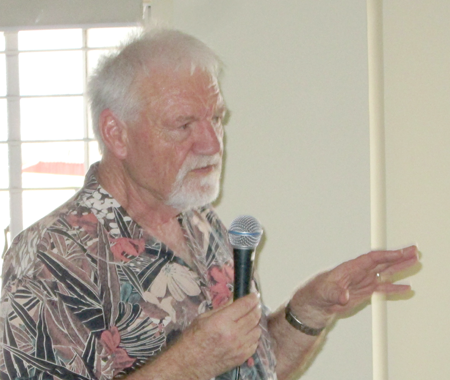
Sep 26, 2016 | News
 Dr. David Robie, AMIC’s Asian Communication Awardee 2015, called for greater press freedom in the Asia Pacific in two talks he made while on a personal and business visit in the Philippines.
Dr. David Robie, AMIC’s Asian Communication Awardee 2015, called for greater press freedom in the Asia Pacific in two talks he made while on a personal and business visit in the Philippines.
AMIC coordinated part of Robie’s tour.
As part of his Philippine tour, Robie spoke with the members of the AMIC Board of Management and urged greater networking in research, academic exchange, and joint projects among media organization in the Asia Pacific region, especially among higher education institutions.
These were among the recommendations raised during the World Journalism Educators Congress (WJEC) held in Auckland, New Zealand in July. Robie is a professor of media and communication at the Auckland University of Technology which hosted the WJEC. He is head editor of AUT’s School of Communication’s Pacific Media Centre.
In his talk at the Asian Institute of Journalism and Communication, Robie underscored the need to support journalists on account of strict rules governing the media in some areas of the region. He cited the case of the Balibo 5, a group of young journalists who disappeared in West Papua in the 1970’s after attempting to conduct an investigative video report in this embattled area.
At the University of Santo Tomas, Robie spoke at the forum Asia-Pacific Journalism for Filipinos Lessons by Seasoned Journalists and Journalism Educators where he emphasized truth as the core of journalism.
“Journalism is really about truth, any experience of truth, and establishing that truth,” Robie said, while urging an audience full of students to adopt a digital strategy to promote human rights for journalists.
He cited the Pacific Media Center that runs the news website Asia Pacific Report as an example of independent campus based media.
AMIC coordinated Robie’s visits to the Center for Media Freedom and Responsibility and the Philippine Center for Investigative Journalism, two media advocacyorganizations based in the Philippines.
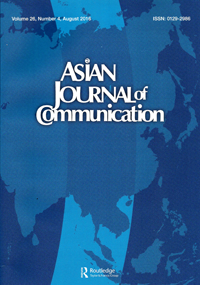
Aug 27, 2016 | Asian Journal of Communication, Media Asia, Publications

Four 2016 issues of Asian Journal of Communication (AJC) and one Media Asia issue are already out.
AJC Vol. 26, No. 4 (August 2016) contains articles probing communication styles in different areas of the world, such as comparing the presidential rhetoric of South Korea President Lee and US President Barack Obama.
Theoretical articles are presented, such as probing moderating role of cultural orientation in explaining temporal orientation of self-referencing, and examining a new contextual perspective for crisis communication theory comparing the Eastern and Western traditions.
Communication issues that have arisen in specific countries are also probed, such as an examination of Chinese media’s implicit and explicit agendas; changes of cultural representation in Indonesia’s children’s television from 1980s-2000s; and examining the impact of message framing and temporal distance related to the communication to young Chinese of the human papilloma virus.
The AJC August 2016 issue also contains a book review of Making news in India: Star news and Star Ananda, written by SomnathBatabyal and published by Routledge.
Meanwhile, Media Asia Vol. 43, No. 1discusses the national anniversaries of Philippines and Indonesia as “narratives of remembrance”, with an interview of Dr. Crispin C. Maslog, AMIC Board of Directors chairperson, remembering the People Power Revolution. It contains two articles on what happened in Indonesia in 1965 when the Sukarno government was overthrown.
Articles also include a discussion of Japan press clubs, a Chinese dating show, television in India, reporting on the Malaysian Airline MH370 tragedy, border radio in Thailand and Malaysia, Indian Media Organization, and social media influencers in Singapore.
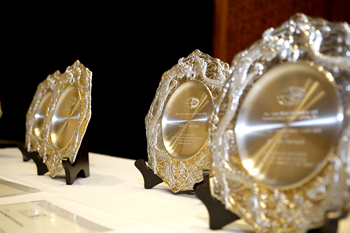
Aug 23, 2016 | News
 Be among Asia’s communication icons.
Be among Asia’s communication icons.
Nominations are now being accepted for the AMIC Asia Communication Award 2016. Through this award, the Asian Media Information and Communication Center (AMIC) recognizes outstanding achievements in the following communication fields and categories: research, education, institution building, and journalism.
Past awardees include Dr. John Lent, Prof. Eddie C. Y. Kuo, Dr. Nora Quebral, Dr. Florangel Rosario-Braid, Dr. BinodAgrawa, Dr. K. E. Eapen, Dr. Hidetoshi Kato, Dr. Georgette Wang, Dr. Crispin Maslog, Tan Sri Dato’ L. Krishnan, Dr. AlwiDahlan, Mr. JakobOetama, Alan Hancock, and David Robie.
Nominations will be accepted from AMIC members. The closing date is on 30 September 2016. Please accomplish the nomination form, which can be downloaded from www.amic.asia. Send the form, together with a nomination letter, to the following:
Mr. Ramon R. Tuazon
Secretary-General
Asian Media Information and Communication Centre (AMIC)
E-mail: r.tuazon@amic.asia and rrtuazon722@yahoo.com
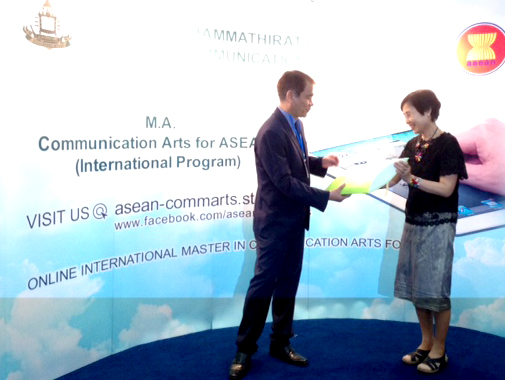
Aug 22, 2016 | News
 Asian Media and Information Centre (AMIC) secretary general Ramon R. Tuazon urged communication schools in ASEAN countries to actively pursue regional integration in communication education.
Asian Media and Information Centre (AMIC) secretary general Ramon R. Tuazon urged communication schools in ASEAN countries to actively pursue regional integration in communication education.
Mr. Tuazon made the call in his keynote address during the Regional Forum on Communication for Smart ASEAN via Massive Open Online Courses (MOOCs) on August 10. The forum was organized by the International Master’s Program of Communication Arts for ASEAN of Sukhothai Thammathirat Open University (STOU) in Bangkok, Thailand.
According to Tuazon, while programs in engineering, architecture, and medical sciences have achieved significant progress in pursuing ASEAN program integration, little progress has been achieved in communication and journalism education. The envisioned integration is part of borderless education.
Tuazon described borderless education as a system of transfer of credits, joint degrees granted by educational institutions and non-traditional partners such as business and industry, recognition of degrees, and comparability of qualifications.
To pursue borderless education and a higher education area in ASEAN, Tuazon reminded ASEAN educators of the need to adopt national qualifications and quality assurance systems toward an ASEAN Reference Qualifications and Assurance Frameworks.
The Philippines has already drafted its qualifications framework for communication which can be a model for other ASEAN countries.
To jumpstart the pursuit of borderless communication and journalism education in ASEAN, AMIC plan to undertake studies on competencies compatibility and comparability, craft a draft ASEAN Reference Qualifications Framework, and conduct a feasibility study for an ASEAN and Asia-Pacific accreditation standards system for communication and journalism schools.
AMIC also plans to do an ASEAN communication and journalism curriculum review which focuses on compatibility and comparability and develop learning resources such as an AMIC textbook for communication and journalism courses common among communication and journalism schools in the Asia-Pacific region.
During the two-day conference, STOU launched its Thailand MOOCs. Dr. Kamolrat Intaratat, program chair of the Master of Communication Arts for ASEAN Program, was the conference lead convenor.
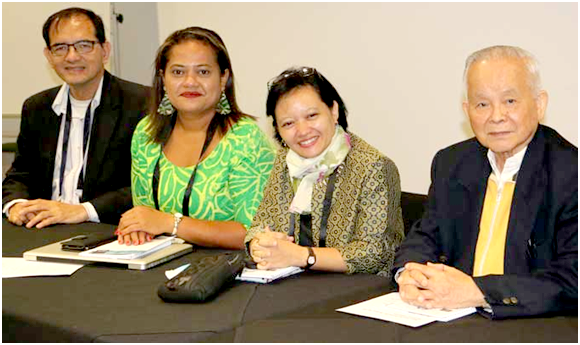
Aug 8, 2016 | News
 AMIC Board Chair Crispin C. Maslog (right) and former AMIC Secretary-General Jose Ma. Carlos (left) participated in the fourth World Journalism Educators Congress in Auckland, New Zealand, July 14-16. (The two women in the panel are from left Vicky Lepou of Samoa and Hermin Indah Wahyuni of Indonesia).
AMIC Board Chair Crispin C. Maslog (right) and former AMIC Secretary-General Jose Ma. Carlos (left) participated in the fourth World Journalism Educators Congress in Auckland, New Zealand, July 14-16. (The two women in the panel are from left Vicky Lepou of Samoa and Hermin Indah Wahyuni of Indonesia).
Dr. Maslog was sponsored by the New Zealand Foundation and Joe Carlos was funded by the Pacific Media Centre in Auckland, headed by Dr. David Robie, AMIC Asia Communication Awardee in 2015.
The World Journalism Education Congress (WJEC), with the theme Identity and Integrity in Journalism Education, kicked off with a formal pōwhiri ceremony hosted in the Sir Paul Reeves building at the Auckland University of Technology (AUT).
 The traditional welcome was led by AUT students and staff. The conference brought together more than 220 media and journalism educators from 42 countries around the world for three days of discussions about global media challenges and education.
The traditional welcome was led by AUT students and staff. The conference brought together more than 220 media and journalism educators from 42 countries around the world for three days of discussions about global media challenges and education.
Maslog and Carlos participated in the panel on Post-Cop 21 – Journalism Education in Asia-Pacific: Responding to Key Issues on Climate Change. The panel, chaired by Robie, was unanimous in saying that there is a critical need to educate journalists in the region on the problems brought about by climate change, and for the schools to start offering courses on environmental reporting. So far very little is done in this area.
Maslog also joined another panel on Global Mass Communication and Journalism Research, chaired by Dr. Alex Tan of Washington State U in the U.S. The panel was meant to provide input to a book on research being planned by Dr. Tan.
The Congress voted on Paris as the site of the next WJEC Congress three years from now in 2019.

 Dr. David Robie, AMIC’s Asian Communication Awardee 2015, called for greater press freedom in the Asia Pacific in two talks he made while on a personal and business visit in the Philippines.
Dr. David Robie, AMIC’s Asian Communication Awardee 2015, called for greater press freedom in the Asia Pacific in two talks he made while on a personal and business visit in the Philippines.


 Be among Asia’s communication icons.
Be among Asia’s communication icons.
 Asian Media and Information Centre (AMIC) secretary general Ramon R. Tuazon urged communication schools in ASEAN countries to actively pursue regional integration in communication education.
Asian Media and Information Centre (AMIC) secretary general Ramon R. Tuazon urged communication schools in ASEAN countries to actively pursue regional integration in communication education. 
 AMIC Board Chair Crispin C. Maslog (right) and former AMIC Secretary-General Jose Ma. Carlos (left) participated in the fourth World Journalism Educators Congress in Auckland, New Zealand, July 14-16. (The two women in the panel are from left Vicky Lepou of Samoa and Hermin Indah Wahyuni of Indonesia).
AMIC Board Chair Crispin C. Maslog (right) and former AMIC Secretary-General Jose Ma. Carlos (left) participated in the fourth World Journalism Educators Congress in Auckland, New Zealand, July 14-16. (The two women in the panel are from left Vicky Lepou of Samoa and Hermin Indah Wahyuni of Indonesia). The traditional welcome was led by AUT students and staff. The conference brought together more than 220 media and journalism educators from 42 countries around the world for three days of discussions about global media challenges and education.
The traditional welcome was led by AUT students and staff. The conference brought together more than 220 media and journalism educators from 42 countries around the world for three days of discussions about global media challenges and education.